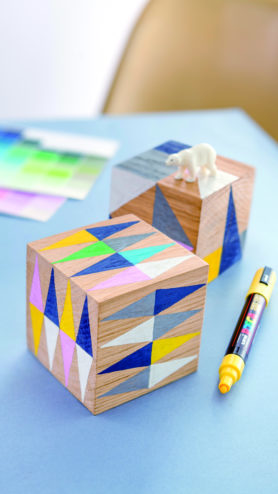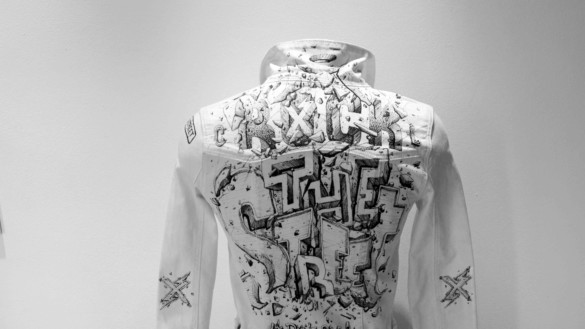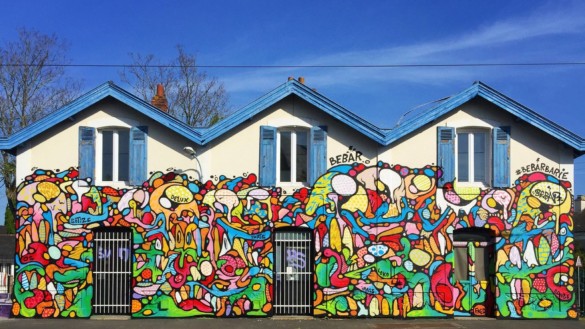
Aurélien Jacob, Nono to his close friends and family


Aurélien Jacob is an escapable figure on the Brittany surf scene. Even though he’s not from the region, he represents the wave from the Golf de Golf de Gascogne to the Côtes d’Armor. Extreme sports activist, accomplished surfer, live wire, and international hero, he is also a surfing instructor.
Aurel devotes his time to the sea, whether calm or heavy. He left for Indonesia with his friends Ronan and Ewen to shoot an adventure movie: He’s going to tell us about the Usion Islands and the story behind their new project. Here is the first part of a long telephone call…
“Can you introduce yourself in broad terms?
Well, ha, listen, I’m from the East of France, and because my dad was military, we travelled a lot, to French Guyana, and Reunion. That’s where I started surfing, at 8 years old. Then, we moved to Brittany in 1995, just in time to start 6th grade. I’ve travelled a lot since then, but I’ve really settled down here. I’ve lived in all four departments of Brittany. So, basically I’ve been surfing for 22 years, mostly in the region.”
“How did you get into surfing?
My father was a triathlete, so already as a kid he took me and my brother to the pool a lot. Then in French Guyana, we spent loads of time at the beach and, at Reunion, we lived right next to a surfing spot. In no time, I noticed there was a gang of elementary school kids my age that all hung out together all the time. They were surfers and already in a club so it was easy to connect with them and take some beginner classes. We played in the waves with our little body boards and the day my instructor handed me a surfboard and I rode my first wave lying down, it was a revelation. Of course, I bugged my parents to let me go every Wednesday, Saturday, and Sunday.
Once you taste it, you can’t let go. After that, my dad got transferred to Brittany and even though surfing isn’t as developed, media-wise and in terms of infrastructure, there are lots of surf schools and clubs. Despite the cold and the fact you have to wear wetsuits, it was easy to keep it up.”
“Is surfing in Brittany particular? What are the region’s characteristics?
Bretagne (Brittany) is 2,800 kilometres of very divided coastline, with a north Channel side, a south side on what we’ll say is the Atlantic coast, and a south side in the Golf of Gascogne. So we’re pretty high in the Atlantic to get a lot of depression. Like fishing and navigation, surfing is pretty complicated with tides, currents, and rocks. It’s just as much fun as the French coast, which is very linear, but it leaves spots systematically exposed, spots that saturate when the swells are too big or when the wind isn’t blowing in the right direction, which creates waves that are a little rough.
Brittany is pretty particular compared with the rest of France, in the sense that you can pretty much surf all year if you know the spots and their characteristics well: water height, tides, current, the direction of swells and wind. In contrast, the farther south you go, the more the coast resembles a big beautiful highway. So, as soon as there’s a bad wind and not the greatest conditions, you don’t surf. You do something else. Of course, I’m exaggerating, but that’s pretty much the way it is. In Brittany, if you’re okay with taking the road, you can always find a little bit of acceptable wave and jump right in.”
“Searching for waves is an everyday thing…
Yeah, that’s it… But, you know, the carbon footprint of surfers around here is positive (smile). For example, today, I’m in Lorient, on my way to Loquirec. That’s a two-hour drive. Tomorrow morning, I’m going to a photo shoot at a secret spot. After that, I’m going back to the same area… You spend more time driving than surfing. But, in terms of wave quality, it’s pretty exceptional…”
“Does the fact you ride very different waves, allow you to adapt more easily when you travel?
Yes, that’s right. I don’t like comparisons but Basque Country has crashing rock waves , the Landes has quite a lot of sandy spots like the Atlantic coast in general; in Brittany, we also have sandy spots we call ‘beach breaks’, but we also have a lot of points and ‘reef’ spots [rocky spots-editor’s note], many are classic with waves that roll out normally and long. We also have a lot of ‘slab’ type waves, which are waves that are a little bit more lively, dangerous, right up against the rocks, with very little water, very technical waves. So, when you travel and you find yourself back on waves that break over coral, you are a lot more comfortable because you’ve already surfed rock waves. You know what to expect. Anyway, I started out surfing in spots with rocks and coral, so when I got to Brittany, in competition for instance, as soon as there were more hollow and powerful waves, I was more comfortable, and a little less impressed of course.
“You and your friends Ewen and Ronan went on a pretty special trip. You made a movie “Des Îles Usions”, which is pretty impressive. Can you tell us a little more about this project?
“Des Îles Usions” is the project of three city boys that live in harmony within society, with everything that life offers in terms of creature comforts. For example, it’s easy to take your car, go surfing, go to the bakery, I mean, grab something to eat, sleep well at night to be in good shape the next day at dawn. And even though surfing is considered to be a cool sport, it’s super physical and having a very good quality of life makes it possible to be in good shape and surf well.
For “Des Îles Usions”, the goal was to find out if the three of us, removed from society, would be as comfortable on a deserted island, living by our own means, all while surfing. We prepared the project, asked our sponsors for help (thanks to them, they’re mentioned on the site) to get to Indonesia with 120 kilos of equipment, solar panels, harpoons, surfboards, etc.
It took us a month to find a deserted island. It’s really complicated to find an island with no living soul on it and good waves. In general, the locals don’t want the waves, foreign surfers do. We found an island with two waves, one right and one left, and the objective was to survive as long as possible. That’s why it’s called “Des Îles Usions”. We wanted to stay 40 days and 40 nights. We ended up asking a fisherman who lived about two hours away from the island to drop us off. Except we were completely dead after 23 days.
And even though we managed to get a little time to surf, we spend our days collecting wood, keeping the fire alive, digging a hole to find water, purifying it, battling the elements, the rain and storms, and most of all, searching for food and cooking it, not to mention trying to stay healthy.”






















.png)





















.png)






